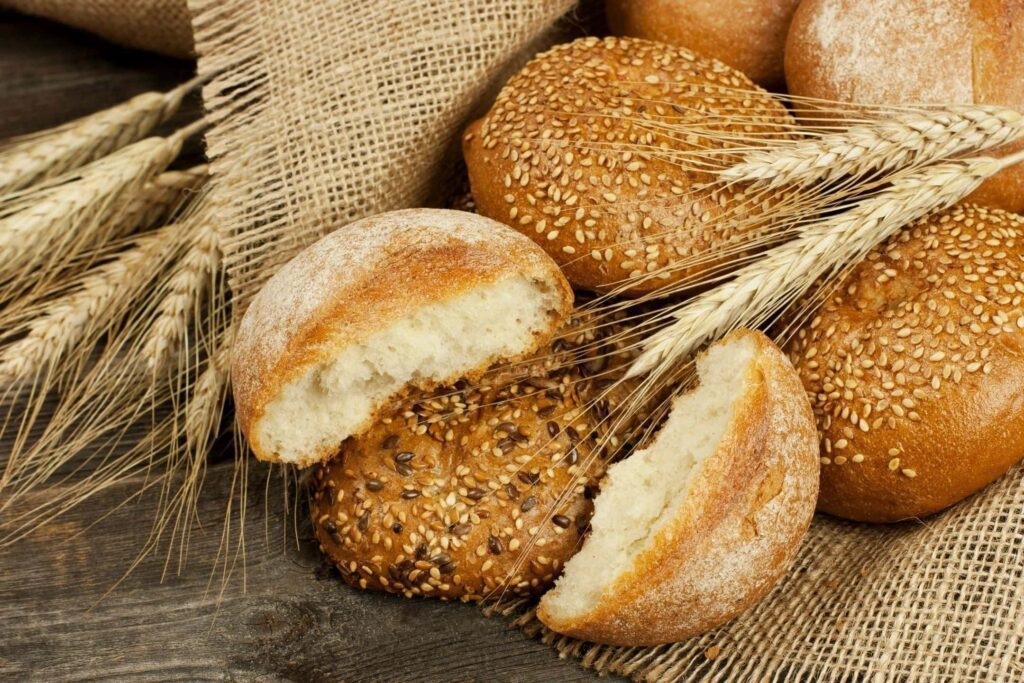
Grains that affect your blood sugar

Whole-grain bread is made from all three of its natural components: the germ, the bran, and the endosperm. Refined grains have only the starch-laden endosperm and lack the germ and bran which are high in nutrients and fiber. Because of this major difference in processing, refined grains are more quickly converted to glucose and thus affect blood sugar more rapidly than whole grains. Please note that any food that contains digestible carbs will raise your blood sugar (blood glucose) although some types and forms of carbohydrates will raise your glucose levels much more than others.
https://www.youtube.com/watch?v=Bo4Q-LVCMa0
Simple carbohydrates:
Simple carbohydrates are composed of sugars, such as fructose and glucose, which have simple chemical structures composed of only one sugar or two sugars. Simple carbohydrates are more quickly converted to glucose than complex carbohydrates, often leading to a faster rise in blood sugar which can have negative health effects.
Complex carbohydrates:
Complex carbohydrates have more complex chemical structures, with three or more sugars linked together. The majority of complex carbohydrate foods contain fiber, vitamins, and minerals, and they take longer to digest and convert to glucose. This means they have less of an immediate impact on blood sugar, causing it to rise more slowly. However, please note that all digestible carbohydrates, including complex carbohydrates, affect blood sugar.
Wheat and Wheat Products
Wheat is a grain that contains complex carbohydrates specifically, amylopectin and amylose. Both of these are digested in the GI tract and converted into glucose for your body to use. However, because amylopectin is more rapidly converted to glucose and absorbed into the bloodstream, it is mainly responsible for wheat’s blood-sugar-increasing effect. The way in which wheat is processed also influences its effect on blood sugar. Like grains, refined wheat is more quickly converted to glucose and thus affects blood sugar more rapidly than whole wheat.
Take-Home Message
Reducing intake of grains, reduces carbohydrates, and improves blood sugar levels, reduces insulin levels, and decreases the risk for developing pre-diabetes and diabetes.
The Glycemic Index of Products
The glycemic index (GI) ranks carbohydrates on a scale from 0 to 100 based on how quickly and how much they raise blood sugar levels after eating. Foods with a high glycemic index, like whole-grain wheat bread, are rapidly digested and cause substantial fluctuations in blood sugar. Foods with a low glycemic index, like whole oats, are digested more slowly, resulting in a more gradual rise in blood sugar.
Glycemic Indexes of Selected Foods:
- Whole grain bread 72
- White bread 69
- Shredded Wheat cereal 67
- Sucrose (table sugar) 59
- Quinoa 53
Yes, you read this correctly, white bread has a lower GI than whole-grain wheat which has a higher GI than table sugar, sucrose. More information regarding the GI and GL of common foods is available online (https://www.glycemicindex.com/).
Low Glycemic Grains:
· Rye has less gluten than wheat flour, so you need to combine it with other gluten-containing flours in order to make bread. Pumpernickel bread made with rye flour has a low glycemic index of 55.
· Spelt has a higher protein, B vitamin, potassium, and iron content than other varieties of wheat, giving it a nutritional edge. Bread made with spelt flour has a glycemic index of 54, making it a lower-glycemic bread choice.
· Quinoa, not botanically considered a grain, has a low glycemic index of 53.
· Bulgur has a low glycemic index of 48, and one cup of it has fewer calories yet more than twice the fiber of rice.
· Barley contains more fiber and vitamin E than wheat with a glycemic index of only 25
Author Devin Wilson ND, CCT

As an integrative doctor, I utilize all appropriate treatment tools in managing my patients. Using the therapeutic order as a guide for naturopathic treatment stratification, we find that removing obstacles to cure and dietary modifications are pillars of a comprehensive plan. Contemporary society and modern science alike have witnessed the effects of the western diet such as obesity and type two diabetes epidemics, but can diet have an additional effect on health and diseases.
#kiyalongevity #bloodsugar #sugar
**Disclaimer**This site and its services are for consumer educational use only. Nothing contained in this article is or should be considered or used as a substitute for medical advice, diagnosis, or treatment. Never start any diet, exercise, or supplement program without consulting your medical provider. This article and its services do not constitute the practice of medicine. Users should always seek the advice of a physician with any questions regarding their health or medical conditions. Never disregard, avoid, or delay obtaining medical advice or following the advice of a physician because of something you have seen or read on this site.
